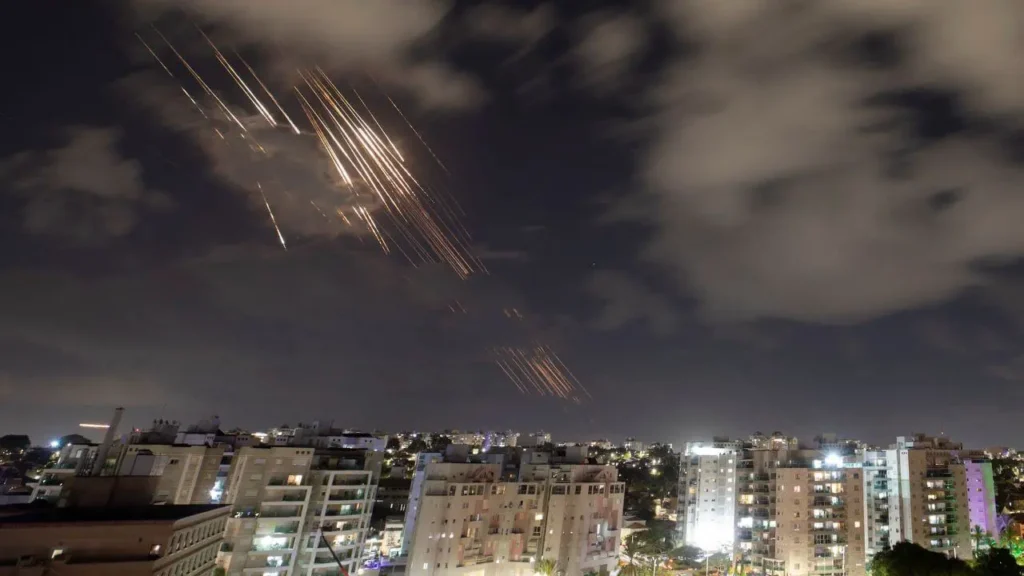Escalation in Middle East Tensions as Iran Retaliates for Killings of Hezbollah and Hamas Leaders
In a dramatic escalation of regional tensions, Iran fired a barrage of ballistic missiles at Tel Aviv on Tuesday, marking a significant retaliation against Israel’s recent actions in Lebanon and the killings of key figures in Hezbollah and Hamas. This attack has raised fears of a broader conflict in the already volatile Middle East.
The Attack
- Iran’s Revolutionary Guards launched the missile attack.
- Alarms sounded across Israel, with explosions heard in Jerusalem and the Jordan River valley.
- Israeli media reports suggest up to 100 missiles were launched.
- The attack lasted approximately one hour before Israeli military declared it over.
Immediate Impact
- At least two people sustained light injuries from shrapnel in the Tel Aviv area
- Minor injuries reported nationwide as people rushed to shelters
- Air traffic halted at Israel’s Ben Gurion airport
- Israelis took shelter in bomb shelters during the attack
Iran’s Justification and Warnings
Iran’s Revolutionary Guards stated that the missile attack was in response to several recent events:
- The killing of Hamas leader Ismail Haniyeh
- The assassination of Hezbollah chief Hassan Nasrallah
- The death of an unnamed Guards commander
Iran has issued a stark warning to Israel, threatening “crushing attacks” if there is any retaliation to this missile strike. The Iranian mission to the United Nations in New York described the attack as a “legal, rational, and legitimate response to terrorist acts.”
Israeli Response and Preparedness
Prior to the attack, the Israeli military had warned the public of a potential widespread ballistic missile strike from Iran. The country’s advanced missile defense systems were activated, with Reuters journalists reporting interceptions in the airspace of neighboring Jordan.
After the attack, the Israeli military announced:
“Following the situational assessment, it was decided that it is now permitted to leave protected spaces in all areas across the country.”

International Reactions
United States
U.S. President Joe Biden has pledged support for Israel’s defense:
- Biden directed the U.S. military to aid Israel’s defence and shoot down missiles targeting Israel
- The President and Vice President Kamala Harris monitored the attack from the White House situation room
United Nations
UN Secretary-General Antonio Guterres condemned the escalation:
“This must stop. We absolutely need a ceasefire.”
Context of Escalating Tensions
This missile attack comes amidst a rapidly deteriorating situation in the region:
- Israel has recently launched ground raids into Lebanon, the first in 18 years
- Intensive Israeli airstrikes have targeted top Hezbollah leadership
- Over a thousand Lebanese have been killed, with a million displaced
- Iran had previously vowed retaliation for Israeli actions against its allies
Potential for Further Escalation
The situation remains highly volatile, with several factors contributing to the risk of further escalation:
- Iran’s Supreme Leader Ayatollah Ali Khamenei reportedly gave the order for the missile launch
- Iranian officials claim to be “fully ready for any retaliation”
- The involvement of Hezbollah, Iran’s powerful proxy in Lebanon, adds another layer of complexity
- The ongoing conflict in Gaza continues to fuel regional tensions
Looking Ahead
As the international community grapples with this latest development, several key questions emerge:
- How will Israel respond to this direct attack from Iran?
- Can diplomatic efforts prevent further escalation?
- What role will the United States and other global powers play in de-escalating the situation?
The coming days will be crucial in determining whether this attack marks the beginning of a wider regional conflict or if cooler heads will prevail in the face of mounting tensions.

